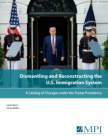North America
Recent Activity

This discussion marked the launch of MPI's Rethinking U.S. Immigration Policy Initiative, which aims to generate a big-picture, evidence-driven vision of the role immigration should play in America’s future, as well as to build a bipartisan center so needed reforms can be enacted.

This event features a smart conversation by a range of experts on U.S.-Mexico border conditions, looking at policy responses by both countries and regional cooperation.

This discussion on the 1986 Immigration Reform and Control Act (IRCA) showcases MPI Fellow Charles Kamasaki's book, Immigration Reform: The Corpse That Will Not Die. Kamasaki is joined by other veterans of the IRCA debate for a conversation on the lessons, the intended and unintended consequences, and how the law’s legacy has shaped contemporary politics on immigration.

With the U.S. administration calling for the United States to adopt a more “merit-based” immigrant selection system, this conversation focused on what policymakers should consider in designing—and managing—immigrant selection systems in a time of intense labor-market and demographic change.

At this discussion, experts from MPI and Southern Methodist University’s Texas-Mexico Center offer an overview of trends and key characteristics of highly skilled Mexican adults at the national level and for Texas, including educational levels by legal status and top industries of employment across Texas metro areas. They also discuss the policy implications of these findings.






















